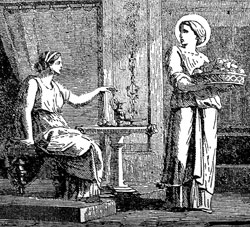
Feastday: July 29
Death: 119
A slave and martyr, also called Seraphia. She was the servant of St. Sabina and was responsible for the Roman noblewoman’s conversion to Christianity. Both Sabina and Serapia were subsequently beheaded during the persecutions of Emperor hadrian.
Serapia was a Roman saint, a slave and martyr, also called Seraphia or Seraphima of Syria. Saint Serapia was born at Antioch in the late 1st century, of Christian parents who, fleeing the persecution of Emperor Hadrian, went to Italy and settled there. When her parents died, Serapia was sought in marriage by many, but having resolved to consecrate herself to God alone, she sold all her possessions and distributed the proceeds to the poor. Then she sold herself into voluntary slavery, and entered the service of a Roman noblewoman named Sabina. The piety of Serapia, her love of work, and her charity soon gained the heart of her mistress, who became a Christian. She died in 119 CE.
In the reign of Hadrian, Serapia was commanded to do homage to the gods of Rome. She refused and was handed over to two men who tried to rape her, but she resisted. They then tried to set her on fire with torches, but could not do so. By command of the judge Derillus, she was beaten with rods and then beheaded by sword. Her body was buried by Sabina in Sabina's own tomb, near the Vindician field, but the memory of her martyrdom is kept more especially on September 3, on which day their common tomb was finished, adorned and consecrated as a fitting place of prayer.
In art, Saint Serapia holds a tablet or book; sometimes she appears with Saint Sabina.





